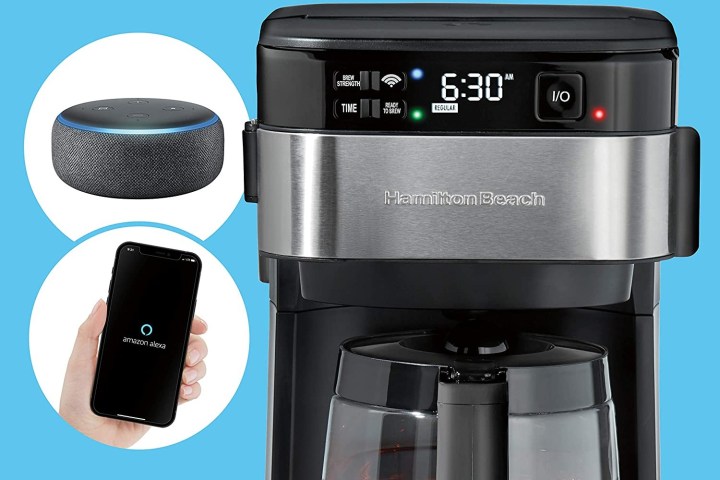Have you ever given any thought to what the word ‘smart’ truly means? At its most basic it denotes someone who is clever, quick-witted, or very intelligent. But what about when it comes to a smart device? The dictionary (or Alexa, if we’re being honest) would say a smart device is one that’s programmed to be capable of some type of independent action. The keywords there are “some type.” That’s the trouble with smart devices, gadgets, and appliances: ‘smart’ isn’t a universally understood or regulated feature.
Too often manufacturers, in a bid to sell more gadgets, tack on the word smart in front of any old device. Today’s savvy consumer asks what exactly that means. Is it a clever feature? Wi-Fi connectedness? A companion app? All of the above? Or does something as simple as adding an LED touch screen to an appliance make it smart?

What is ‘smart’?
A ‘smart’ device can mean myriad things depending on the manufacturer. It can be a TV that has Wi-Fi or a smart speaker that can listen and respond to your queries. It can even be a gadget with a companion app. But what kind of smarts are you really getting, and is the technology useful and effective?
Smart ovens are a relatively new concept when it comes to the smart kitchen arena, but even in this small tech space, your options vary wildly. Some use curated food deliveries plus QR codes the oven (or a companion app) will scan. Once the code is scanned, the smart oven takes care of setting the temperature, adjusting the cooking time, and notifying you when the meal is ready. Others use store-bought food alongside an app to recommend recipes or cooking programs that promise to cook food perfectly, but you still have to use your head.
Smart but not smart
What about when it comes to smart kitchen gadgets in particular? Let’s take the example of a smart toaster. In the last year or so there have been two significant launches of so-called smart toasters: the Revolution Instaglo and, more recently, the Tineco Toasty One.
These toasters are marvels of design and beauty and boast bright touch screens and toasting technology that promises crispy carb perfection. In truth, these are regular toasters with the addition of an LED touchscreen display. That’s it. No Wi-Fi, no “Hey Google, hit me with some toast,” and no tiny robotic arms that can retrieve sliced bread, grill it to perfection, then butter it for you. So while the addition of a glowing screen is nice and may allow you a few more options than a dial numbered one through six, in my book, this doesn’t truly constitute genuine smarts.
Certainly not in the same way an Amazon Echo smart speaker with a screen is truly smart. An Echo is connected to the web and can listen for you and respond appropriately. It can manage your schedule, turn on lights and adjust a thermostat, and even order supplies from Amazon for delivery.
However, even internet connectivity is no guarantee of a better gadget. Is, for example, a smart TV that allows streaming truly any more valuable than simply plugging in an external streaming TV dongle?

Some gadgets even put ‘smart’ in the name without ever actually adding intelligence, automation, or connectivity. One example is the Click and Grow Smart Garden is a great indoor winter garden for growing herbs and lettuce but it has no Wi-Fi, no connection, and no automated watering. But it does have an app that will send you push notifications reminding you to refill your water each month. So where is the ‘smart’ in that?
NutriBullet made the Balance Blender which has a Bluetooth connection to a companion app. The app supplies recipes and works with a built-in scale to help you weigh ingredients in the recipe accurately. Pretty smart. There’s a smart toothbrush that will use your phone’s camera to watch you brush your teeth and give you a full report. Alexa-enabled coffee makers also already exist and allow you to call for your morning java from the comfort of the covers.
But there’s another consideration about these smart appliances: do we need that much help with basic tasks?
It’s possible to brush one’s teeth in two minutes without an app and without connecting to Wi-Fi, and while a camera-based brushing assessment might be nice for a check-in once in a while, it’s not the type of technology you’re going to want to use twice each day since it adds time and additional steps. Same deal with the Bluetooth blender; it might be helpful to have the built-in scale display weight on your smartphone the first time you make a recipe, but will you really need it after that? And while a digital touch screen is fun to watch while you’re waiting for toast, is it worth the literally hundreds of additional dollars you’ll spend?
More and more kitchen gadgets are adding smart to the name. Don’t blindly buy the hype. It’s up to us as consumers to understand exactly what we’re really getting and decide if it’s truly worth it.
Editors' Recommendations
"gadget" - Google News
September 28, 2022 at 06:00PM
https://ift.tt/pE3FAqw
Are smart kitchen gadgets worth it? - Digital Trends
"gadget" - Google News
https://ift.tt/HjXY7pC
Bagikan Berita Ini














0 Response to "Are smart kitchen gadgets worth it? - Digital Trends"
Post a Comment